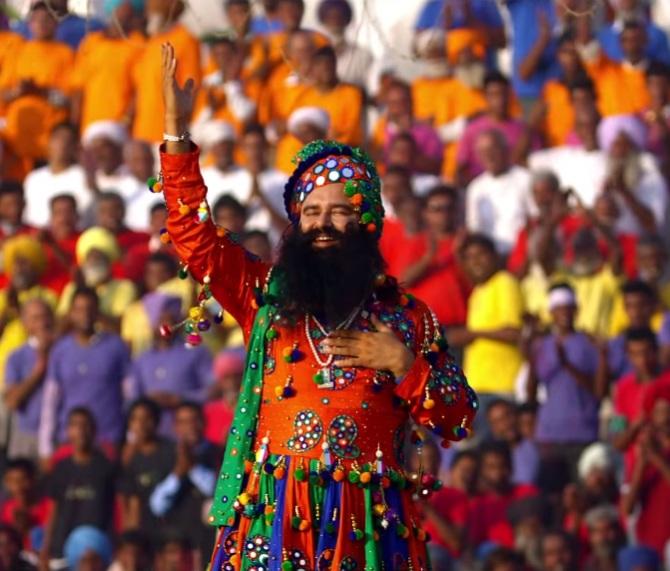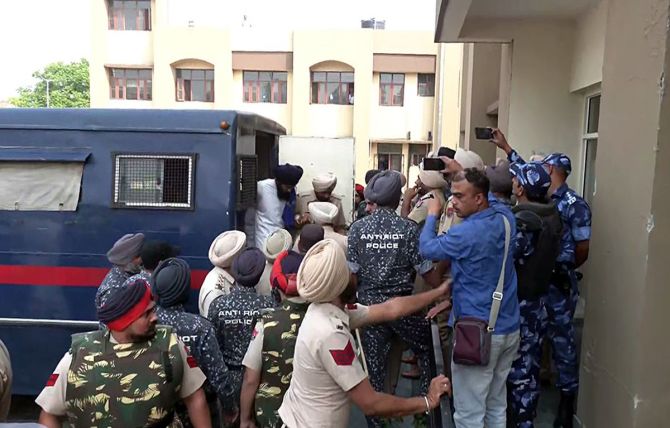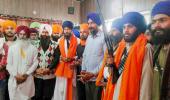If we accept that there is a challenge in Punjab today, any realistic progress can only be made if the rest of the country, especially the government and the ruling party, engage with this sense of grievance, points out Shekhar Gupta.

There are two most important similarities between the mood in Punjab today and at the peak of the earlier crisis in the early 1980s.
The first similarity is the good one.
If you walk around Punjab and ask a random sample of Sikhs if they believe in creating a state separate from India -- or what is loosely called Khalistan -- the chances are that a very, very, large majority will say no.
It will be unanimous unless you run into an oddball.
Many may even ask you to get your head examined. The fact is -- although many in these new nationalist times elsewhere in the country might find it difficult to believe it -- that's how it was in the Bhindranwale era too.
The second similarity is the tough one. You ask the very same people, who laugh at the fantasy of a nation separate from India, if they think the Sikhs are victims of multiple, serious, and egregious injustices, and the answer -- you'd be surprised by how many -- will be yes. That's precisely how it was in the past.
The sense of injustice is, and was, righteous and deep. The line you heard then was the same as what you'd hear now: That the Sikhs are victims of dhakka, or grave injustice.
The 'causes' of the current anger and alienation are broadly four: Sectarian deras (let's say seminaries cum permanent congregations) as an existential threat to Sikhism; the continued incarceration of 'Bandi Singhs' (imprisoned Sikhs, as in the nine convicted on terror and assassination charges and held on long jail sentences).
Third, that those guilty of sacrilege at Sikh shrines and for alleged desecration haven't been caught or punished.
And the fourth is a rhetorical one, that if the BJP and RSS say they are building a Hindu Rashtra, what's wrong with a Sikh Rashtra?
Each one of these has nuances and arguments. And while I know that it's easy to respond to these with irritation and anger, it won't serve any purpose.
In fact, if we accept that there is a challenge in Punjab today, any realistic progress can only be made if the rest of the country, especially the government and the ruling party, engage with this sense of grievance.
This is no call for appeasement. Just that open-minded debate and an open mind never hurt anybody.

Two of these four, impunity for perpetrators of sacrilege, and deras, are to be read together.
The larger fear, as in the 1980s, is that Sikhism is greatly threatened by 'blasphemers' pretending to be Sikh Gurus.
In the past, the target was the Nirankari sect, now it is the heads of the deras.
The first targeted attacks in the past were aimed at the leaders of the Nirankari sect, including its chief.
Now the anger is with the various new 'babas' who claim to be religious teachers but are seen by the devout Sikh as packaging themselves as modern-day Gurus.
This is blasphemy in Sikhism. They are seen to dress and turn out like the Gurus and attract vast populations of Sikhs into their fold.
The foremost of these is the rape/murder convict Gurmeet Ram Rahim Insan.
The last three words of his name were added hurriedly as he faced heat from devout Sikhs for pretending to be a Guru.
That's why the suffixes of a Hindu and a Muslim name to assert a secular view, and Insan (human being) to deny any claim to divinity.
On the ground, however, it makes no difference. His followers are increasing, his deras are being run as if he isn't missing.
And is he missing at all, in spite of his conviction and sentencing for rape and murder? These are the questions the Sikhs ask with a sense of hurt and anger.
If he's guilty of rape and murder, how does he seem to get more time out of jail on parole than inside?
How does he get these long spells of parole as any election in the region, especially in Haryana, approaches? And so many political leaders, especially of the BJP, paying obeisance to him.
The widespread belief among the Sikhs is that his followers were responsible for the incidents of sacrilege and his political clout is the reason no government -- Akalis, Congress or AAP -- has dared to catch and punish the guilty. He owns transferable vote banks.
You want to know how strong this sentiment is, think about the recent lynchings -- including one in the Golden Temple -- of people caught by the devotees on mere suspicion of sacrilege.
The once formidable Punjab police has drawn as much of a blank in catching and punishing those guilty of these lynchings as with the earlier 'sacrilege' incidents.
Of course, you haven't seen any popular revulsion among the devout Sikhs or the clergy at the lynchings.
An added feature of the same insecurity that others are creeping in to convert Sikhs to other faiths and sects is the new wave of Christian evangelism.
The most recent fight Amritpal Singh picked was with Christian pastors, who pushed back with protests.
A lot of the Sikhs, especially from the Scheduled Castes, patronise these new churches just like many more go to the deras.
In each case, it is seen as a threat to traditional Sikhism.
What triggers the Sikh conservatives even more is the fact that many of these pastors still dress in traditional Sikh attire.
For any political party or coalition ruling Punjab, it would have been easier to handle these if the state, or more precisely its electorate, was as homogeneous as many outsiders think it is.
The state is a bit less than 60 per cent Sikh (2011 Census). Among the Sikhs also, there are wide divisions.

The most dominant and visible class and caste, Jatt Sikhs, make up barely 20 per cent of the total population.
The state also, counter-intuitively, has the largest percentage of Dalits of any state in the country, at almost 33 per cent. Or one in three.
They are the ones among whom evangelists -- whether of the deras or Christianity -- find the most purchase.
The third grievance, over what is called the 'Bandi Singh' issue, needs a close look.
Briefly, however, this is about just nine prisoners, serving time for about 25 years after conviction on terror charges.
Six of them were convicted for the assassination of then Punjab chief minister Beant Singh on August 31, 1995.
The remaining three were convicted for terror bombings.
These include Beant Singh assassin Balwant Singh Rajoana, who told journalists outside a dental clinic where he had been taken for treatment that he doesn't even want to be released.
Among the bombers, the most prominent is Devinder Pal Singh Bhullar, convicted for the September 11, 1993 bombing in Delhi where the Congress's Maninderjeet Singh Bitta survived, albeit with a battered body, and nine others died. His death sentence was commuted to life by the Supreme Court.
A campaign has raged for more than a year now for their release.

While it is true that even the Sikh clergy and Shiromani Gurdwara Parbandhak Committee hailed Beant Singh's assassins, and that the Akali Dal keeps fielding Rajoana's sister as a candidate in elections, Sikhs you speak with won't by and large go into whether what they did was right or wrong. They ask a more searching question.
Rajiv Gandhi, they say, was assassinated at around the same time. His convicted assassins, serving life sentences, have been released on compassionate grounds.
Why is this compassion reserved only for non-Sikhs? No political leader in Punjab has the intellect or spine to engage with the protesters on this.
On the other hand, they've been trying to set the 'Bandi Singh' protesters against Amritpal Singh's support base. That's some political 'genius', isn't it!
The last point: If Narendra Modi, the BJP and the RSS can proudly say India is a Hindu Rashtra, why can't we have a Sikh nation?
It will bring us back to the old point: The deep BJP/RSS belief that the Sikhs are Hindus who look different and follow one of the many ways of prayer and worship in Hinduism, so why should they complain.
That's a fundamental misreading, and serious errors of judgement flow from it.
Muslims aren't the only fellow Indians triggered by the talk of a Hindu Rashtra.
By special arrangement with The Print












 © 2025
© 2025